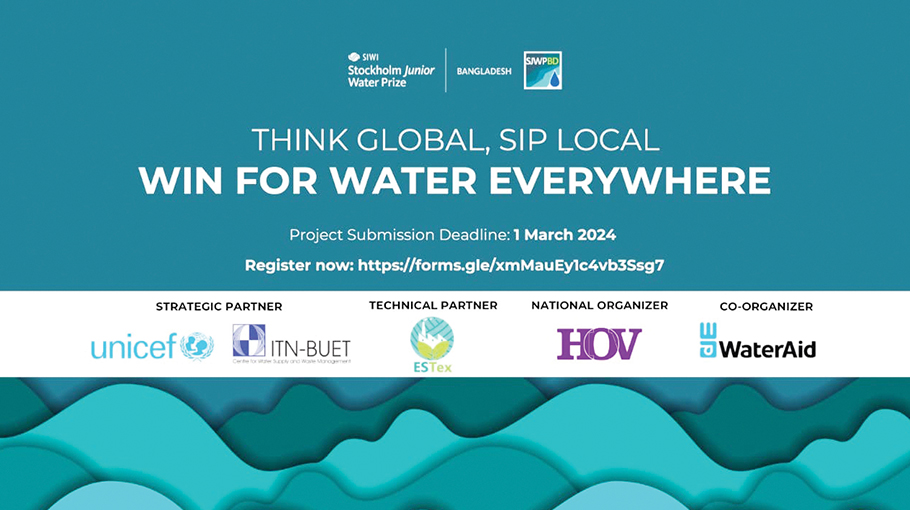Bangladesh Stockholm Junior Water Prize 2024

The Bangladesh Stockholm Junior Water Prize (SJWPBD) is a water science competition for high school and college students that aims to increase interest in water-related issues and research, and to raise awareness and knowledge of local and global water challenges. The SJWPBD is open to projects aimed at improving the quality of life through developing innovative solutions to water related problems. Investigations can include water resource management, water protection, and water and wastewater treatment.
The SJWPBD winner will then go on to represent Bangladesh at the international competition on 22-28 August, 2024 in Stockholm, Sweden.
Eligibility
Every school & college student in Bangladesh aged between 15 and 20 years can enter the SJWPBD. Entered projects must have been developed while still in secondary school. If students have just graduated from secondary school, but have not yet started university, they will still be eligible to enter the competition. Individuals and groups of up to two students are eligible to enter.
Judging
A judging panel to assess nominations for the SJWPBD is established by HOV and consists of between six and nine members of the water industry. The judging process is outlined below:
• Review of student papers by a nominated judging panel
• Scoring is based on the competition criteria
• Selection of three finalists based on paper entries
• Interviews with the three finalists based on the project paper entries
• Selection of national winner based on both paper and interview scores
• Announcement of the SJWPBD winner in formal award ceremony
Task Outline
Students are invited to develop practical and innovative water research projects aimed at improving quality of life and the environment. The scope of the project may be on a local, regional, national or global topic but must have the potential to improve quality of life and/or the environment. All projects must use a research-oriented approach, which means that they must use scientifically accepted methodologies for experimentation, monitoring and reporting results, including statistical analyses. Task outline may include the following steps-
Choose a topic to research
This is your chance to investigate something you are passionate about, something that interests you or grab an idea where you think you could make a real change.
Your topic could revolve around a waterway near your school; how you could improve treatment or control flooding, or it may be an idea to improve water quality or water resources worldwide. Do a bit of research; the world is your oyster!
Decide on your hypothesis or key question to answer
The hypothesis is an „educated guess‟, what do you think your results will achieve? What do you want to know? Why is it important that you find this out?
Research relevant background information
This is important in all projects. It is time to discover what has been done, if anything, on this issue. What part of this research can help you undertake your experiments?
Undertake experiments, monitoring and/or further research
An experiment starts and finishes with factors that change during the experiment. These are the variables. This is where you might want to seek assistance from your science teacher to ensure you undertake accurate experiments or monitoring.
Analyze results
Take some time to carefully review all of the data you have collected from your experiment. Use charts and graphs to help you analyze the data and patterns. Did you get the results you had expected? What did you find out from your experiment?
Prizes
Participate in the SJWPBD and you could win some fantastic prizes!
Trophies: The national winner receives a trophy and certificate
International Travel: The national winner* receives a trip to Stockholm, Sweden to represent Bangladesh in the international SJWP and participate in a weeklong cultural exchange program during August 2023.
You need below documents for project submission
• A completed SJWPBD entry form (SJWPBD will provide)
• Project in Word/PDF format
• Biography (minimum 180 words, maximum 250 words)
• Photo (in jpg or similar format)
• Abstract (minimum 250 words, maximum 350 words)




